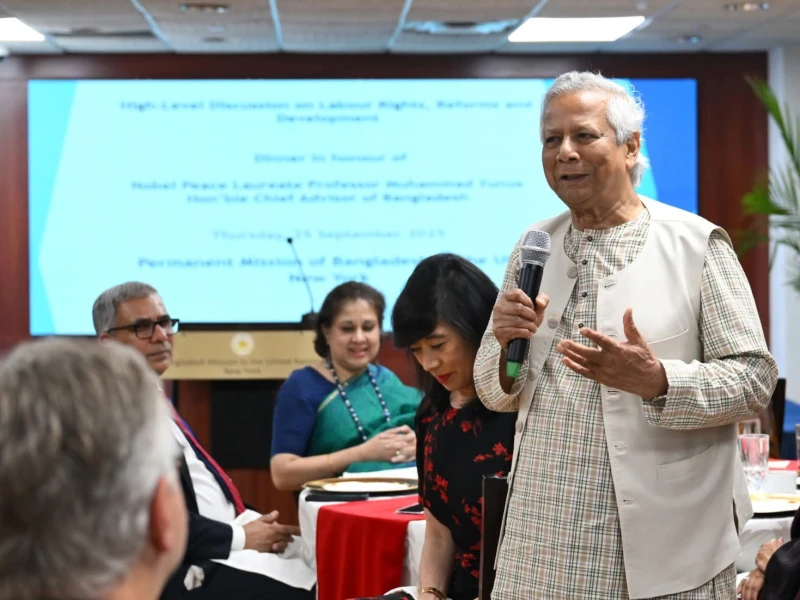Chief Adviser Professor Muhammad Yunus has said that meaningful labour reforms are crucial to attract large-scale foreign direct investment (FDI) in Bangladesh, reaffirming the Interim Government’s commitment to implement key changes in line with International Labour Organization (ILO) conventions before the upcoming national elections in February.
He made the remarks while attending a high-level dinner hosted at the Bangladesh Permanent Mission to the United Nations in New York on Thursday night, where diplomats, UN officials, and senior political figures from Bangladesh joined for a focused dialogue on labour laws, workers’ rights, and ongoing reform efforts in the country.
The discussion, moderated by Lutfey Siddiqi, Special Envoy to the Chief Adviser, included comments from the Director-General of the ILO and senior representatives from various UN agencies. Participants commented on the broader implications of labour reform for Bangladesh’s economic future and international standing.
Leaders from three major political parties in Bangladesh participated, contributing to an open and constructive exchange on labour issues. Before the formal address by the Chief Adviser, political leaders from the three parties were invited to share informal remarks. Each emphasized the importance of the garments industry and expressed support for continued labour sector reform.
Mirza Fakhrul Islam Alamgir, the Secretary General of the Bangladesh Nationalist Party (BNP), described the garments industry as a cornerstone of Bangladesh’s economy.
He noted that any future government must prioritize its growth and sustainability, and acknowledged the Interim Government’s efforts to advance labour reforms and ILO commitments.
Syed Abdullah Mohammad Taher, Nayeb-e-Amir of Jamaat-e-Islami, highlighted that many in his party bring direct experience from the garments industry.
He stated this gives them valuable insight into how the sector can become more globally competitive. He expressed support for the Interim Government’s reform agenda and a desire to build on these reforms if elected.
Humayun Kabir, Foreign Affairs Adviser to BNP’s acting chairman Tarique Rahman, echoed the BNP’s appreciation for the current labour initiatives.
He stated that such efforts should not only be continued, but further expanded under any incoming administration.
A common theme among all three speakers was the urgent need for Bangladesh to secure fairer pricing for its garment exports. It should not be the buyer who always dictates the terms, said one speaker—a sentiment that drew consensus across party lines.
Dr. Tasnim Jara, a senior leader of the Nationalist Citizens Party (NCP), offered a personal reflection, recalling the Rana Plaza tragedy as a defining moment in her political journey. Then a medical student, she volunteered to treat the injured. “That incident shaped my politics,” she said, calling attention to the human cost of unsafe labour practices and the pressing need for reform.
In his closing remarks, Chief Adviser Professor Yunus reiterated the government’s resolve to implement meaningful and lasting reforms.


 Prev Post :
Prev Post :
